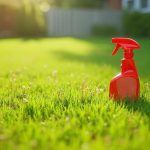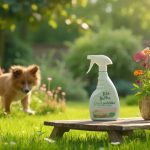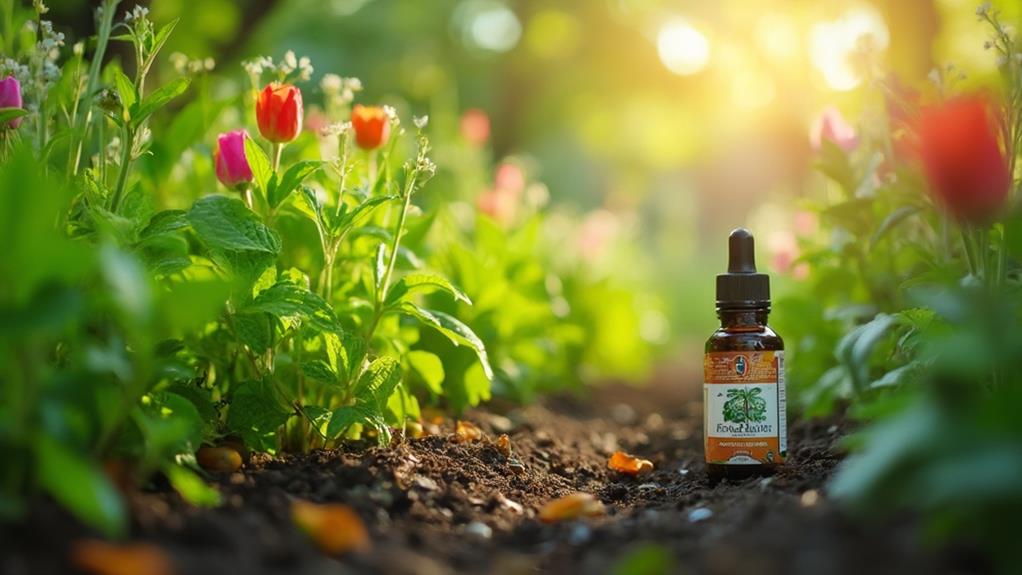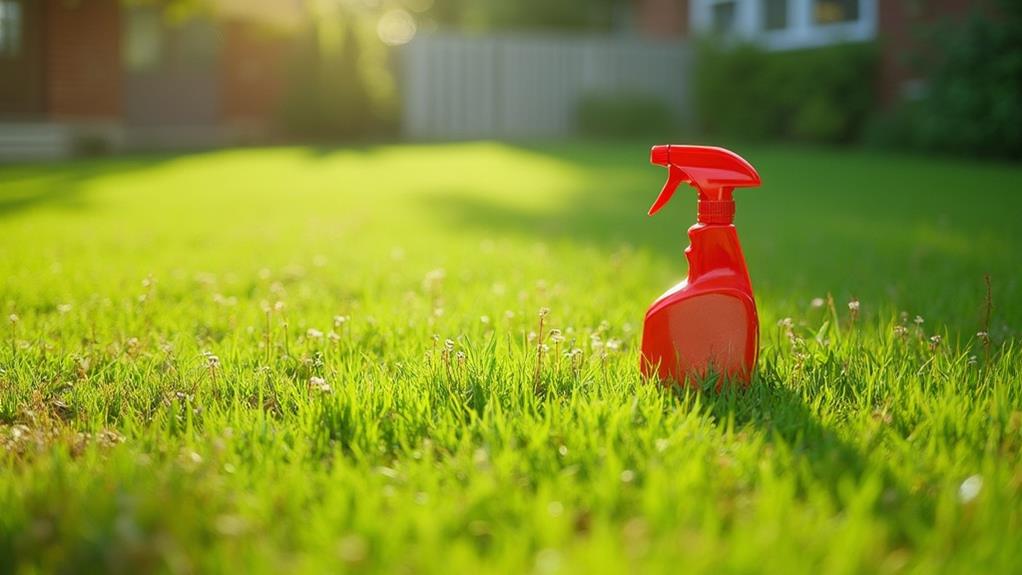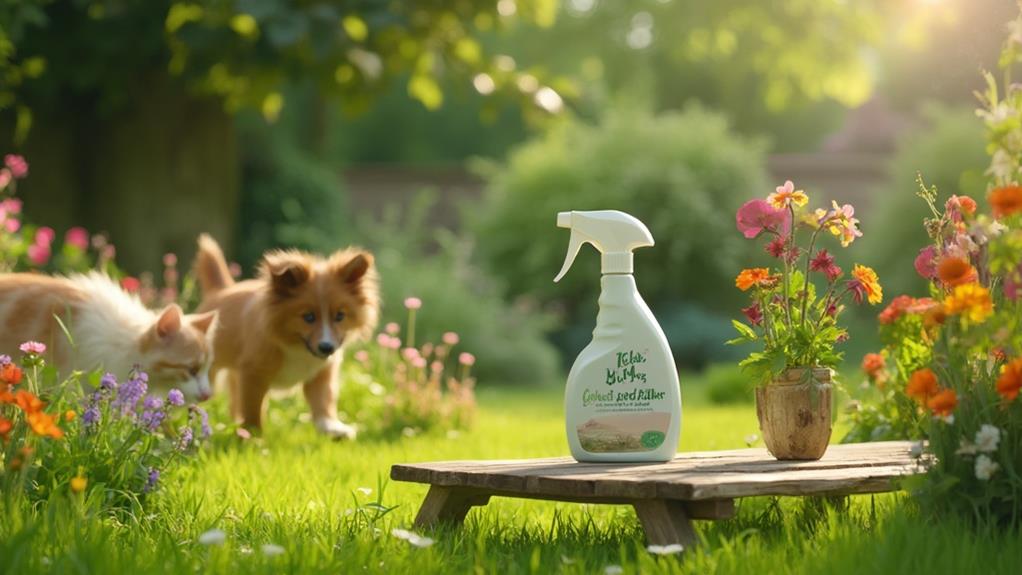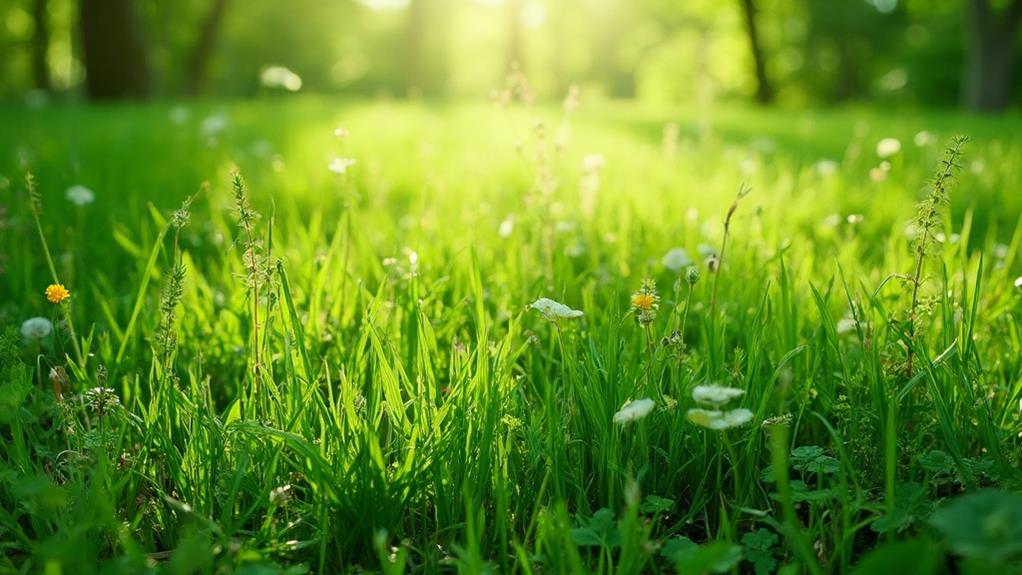When you're tackling weeds in your garden, choosing the right weed killer can make all the difference. You might find yourself wondering about the benefits of selective herbicides versus natural alternatives like vinegar or boiling water. Each option has its own set of advantages and drawbacks, and understanding these will help you protect your plants effectively. As you weigh your choices, consider how the application techniques and timing can impact your results. What you decide next could dramatically shape the health of your garden.
Key insights
- Selective herbicides target specific weeds without harming desired plants, making them ideal for maintaining delicate garden species.
- Pre-emergent treatments prevent weed seeds from germinating, creating effective barriers against annual weed growth.
- Natural weed killers like vinegar-based solutions and boiling water are environmentally friendly alternatives for controlling weeds.
- Proper application techniques, including timing and dosage, enhance the effectiveness of weed killers and protect surrounding plants.
- Regularly inspecting and maintaining garden health through mulching and dense planting helps prevent weed infestations.
Understanding Weeds and Their Impact
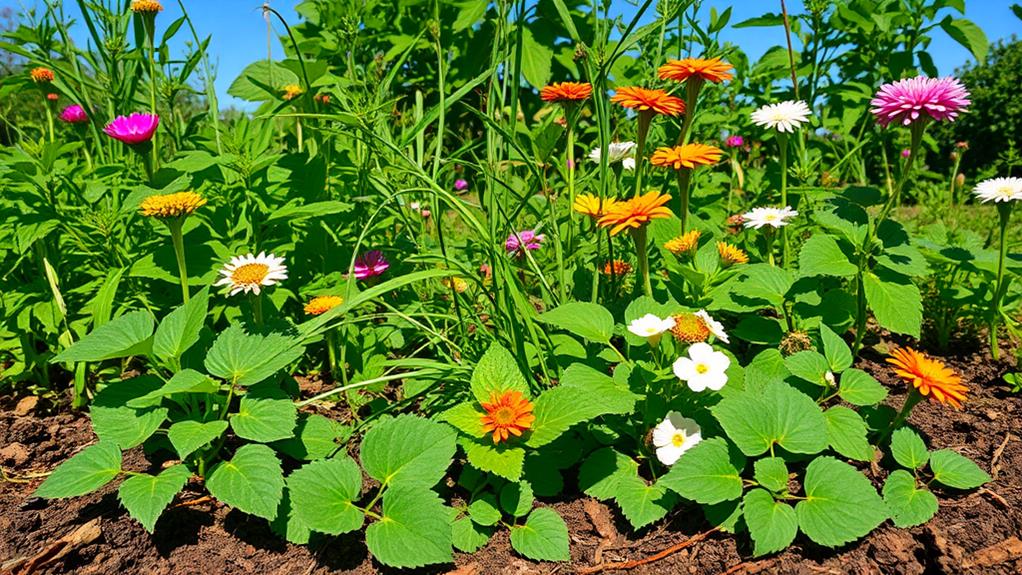
Understanding weeds and their impact on your garden is essential for maintaining a healthy landscape. Weeds compete with your desired plants for sunlight, water, and nutrients, often leading to stunted growth or even death of your prized flowers and vegetables.
To effectively manage them, you need to grasp the basics of weed biology. Weeds are resilient organisms that can reproduce quickly, grow in various conditions, and adapt to many environments.
Effective weed identification is vital for implementing the right control strategies. Start by observing your garden's layout and noting any unfamiliar plants. Familiarize yourself with common weeds in your area; some may be annuals, while others are perennials.
Each type requires different management techniques. For instance, annual weeds may be tackled with early removal, while perennial weeds might need more extensive root system management.
Types of Weed Killers
When it comes to managing weeds in your garden, knowing the different types of weed killers available can make all the difference.
Two primary categories are selective herbicides and pre-emergent treatments.
Selective herbicides target specific types of weeds without harming your desired plants. This is particularly useful if you want to eliminate pesky broadleaf weeds while keeping your grass or flowers intact.
You'll find these products labeled for specific plants, so always check the instructions to guarantee you're using the right one for your garden.
On the other hand, pre-emergent treatments work by preventing weed seeds from germinating.
Apply these treatments early in the season, before weeds start to sprout. They create a barrier in the soil, which stops the growth of annual weeds like crabgrass.
It's vital to time your application correctly, as they won't be effective after weeds have already emerged.
Understanding these types of weed killers helps you choose the right product for your garden needs.
Best Chemical Weed Killers
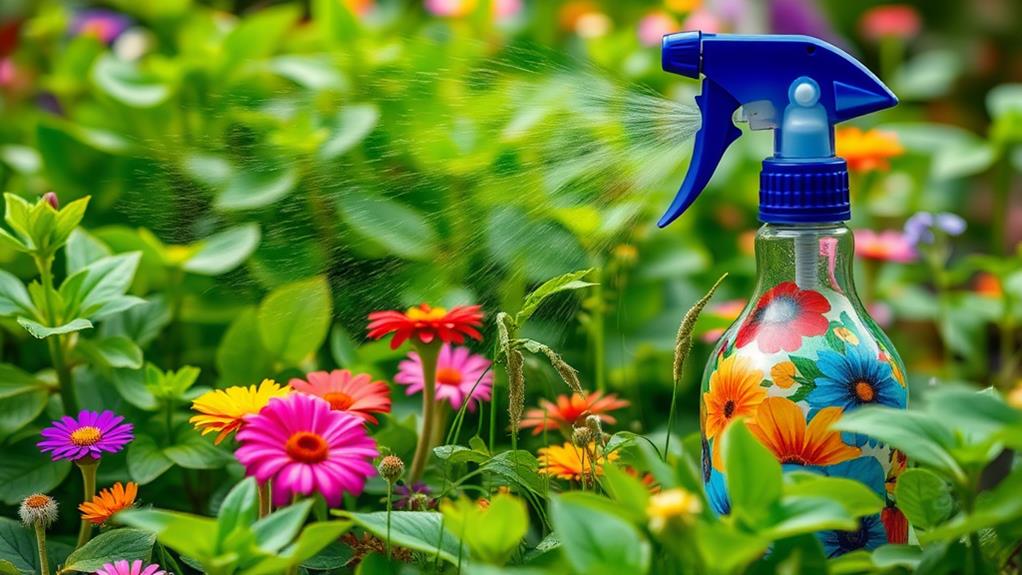
Choosing the right chemical weed killer can considerably impact your garden's health and appearance. When you're battling tough weeds, you'll want to take into account both selective herbicides and pre-emergent treatments.
Selective herbicides target specific weeds without harming your desired plants, making them ideal for gardens where you want to preserve delicate flowers or vegetables. Look for products that specify which weeds they control, ensuring you choose one that meets your needs.
On the other hand, pre-emergent treatments are designed to prevent weed seeds from germinating. Applying these early in the season can save you a lot of hassle later. They create a barrier in the soil that stops weed seeds from sprouting, which is especially useful for annual weeds.
When using chemical weed killers, always follow the manufacturer's instructions for application and safety precautions. Timing is essential; applying at the right moment can enhance effectiveness and minimize your garden's disruption.
Top Natural Weed Killers
If you're looking for effective natural weed killers, vinegar-based solutions and the boiling water method are great options.
Vinegar's acetic acid can effectively kill weeds, while boiling water can scorch them on contact.
Both methods are safe for your garden and easy to use, making them perfect for eco-conscious gardeners.
Vinegar-Based Solutions
Have you ever wondered about a simple, eco-friendly way to tackle stubborn weeds in your garden? Vinegar-based solutions might just be the answer you're looking for. The effectiveness of vinegar as a weed killer lies in its acetic acid content, which can effectively dehydrate and kill unwanted plants.
To make your own weed killer, you can use household vinegar with at least 10% acetic acid. Combine it with a few drops of dish soap to help the solution adhere to the leaves. Spray this mixture directly onto the weeds on a sunny day for ideal results. The sun enhances vinegar's effectiveness, allowing it to penetrate the plant's structure more effectively.
Another popular homemade recipe involves mixing vinegar with salt. A simple ratio of 1 cup of salt to 1 gallon of vinegar can create a potent solution. Just remember, this method can harm surrounding plants, so be cautious when applying it.
Using vinegar-based solutions isn't only effective but also an environmentally friendly way to keep your garden weed-free. With these homemade recipes, you're well on your way to managing those pesky weeds naturally!
Boiling Water Method
One of the simplest and most effective natural methods for killing weeds in your garden is using boiling water. When you pour boiling water directly onto unwanted plants, you take advantage of the high boiling temperature to disrupt their cellular structure, leading to quick weed absorption and death. This method isn't only straightforward but also environmentally friendly.
To effectively use boiling water for weed control, follow these steps:
- Boil the water: Bring a pot of water to a rolling boil.
- Target the weeds: Carefully pour the boiling water directly onto the weeds you want to eliminate, ensuring you cover the leaves and roots.
- Repeat as necessary: For stubborn weeds, you might need to apply boiling water multiple times.
- Be cautious: Avoid pouring boiling water on your desired plants, as it can harm them too.
Using boiling water can be a highly effective and safe way to manage weeds in your garden. Just remember to exercise caution, and you'll keep your garden healthy and thriving!
Application Techniques for Success
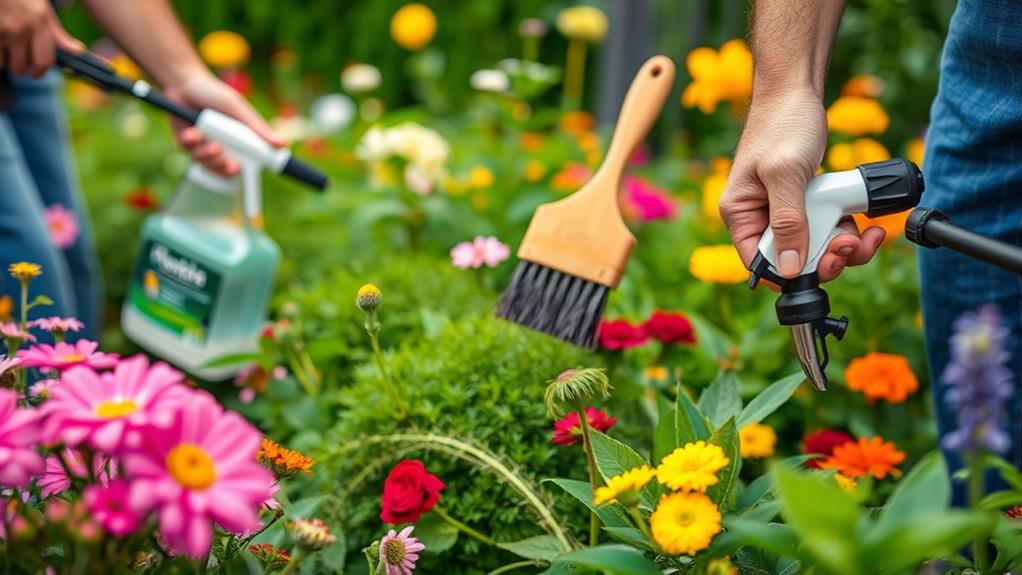
To effectively use weed killer, timing your application is essential; target specific weeds when they're actively growing for the best results.
Make sure you're aware of safety precautions to protect yourself and your plants during the process.
With the right techniques, you can maximize the effectiveness of your chosen product.
Timing Your Application
Timing your application of weed killer is essential for maximizing its effectiveness and minimizing harm to your garden. To achieve the best results, consider seasonal considerations and weather effects before you spray. Each season presents unique challenges and opportunities for weed control, and understanding these can make a significant difference.
Here are some key factors to keep in mind:
- Spring Growth: Apply weed killer when weeds are actively growing, typically in early spring.
- Dry Conditions: Choose a day when it's dry; rain can wash away the product before it penetrates the weeds.
- Temperature: Aim for moderate temperatures, usually between 60°F and 85°F, to guarantee ideal absorption.
- Windy Days: Avoid windy conditions to prevent drift onto desirable plants.
Targeting Specific Weeds
Understanding how to target specific weeds effectively can greatly enhance your garden's health. When dealing with unwanted plants, you'll want to choose selective herbicides that focus on your target species without harming the surrounding flora.
Start by identifying the weeds in your garden—knowing what you're up against is vital.
Once you've identified the weeds, select a herbicide specifically formulated for your target species. Read the label carefully to make certain it's suitable for your garden's plants and the types of weeds you want to eliminate.
Timing is also important; apply the herbicide during the growth phase of the weeds for maximum effectiveness.
Consider the method of application as well. Using a spray nozzle can help you direct the herbicide precisely, minimizing contact with desirable plants. For stubborn weeds, a paintbrush or sponge can allow for more targeted application.
Remember to follow the instructions closely for dosage and frequency to avoid damaging your garden.
Safety Precautions Needed
Safety is paramount when applying weed killers in your garden, and following a few key precautions can protect both you and your plants.
First, make certain to wear appropriate personal protective equipment (PPE). This includes gloves, goggles, and a mask to shield yourself from harmful chemicals.
Next, consider the environmental implications of your chosen weed killer. Opt for products that are less harmful to beneficial insects and nearby plants.
Here are some essential safety precautions:
- Read the label carefully: Always follow the manufacturer's instructions for application rates and methods.
- Choose the right time: Apply weed killers on calm, dry days to minimize drift and maximize effectiveness.
- Keep children and pets away: Make certain your garden is off-limits during and after application to prevent accidental exposure.
- Clean up spills immediately: Take care of any spills to avoid contaminating the surrounding soil or plants.
Tips for Preventing Weeds
To keep weeds at bay, it's vital to stay proactive in your gardening efforts. One effective method is preventive gardening. Start by choosing the right plants for your garden; native species often outcompete weeds for resources.
Make certain you're planting densely, which helps shade the soil and limits space for weeds to sprout.
Incorporating mulching techniques is another powerful strategy. Apply a thick layer of organic mulch, like wood chips or straw, around your plants. This not only suppresses weed growth but also retains moisture in the soil and improves its quality over time.
Remember to keep the mulch maintained, topping it off as needed to maintain an effective barrier against weeds.
Regularly inspecting your garden for any signs of weed growth is essential. Pull out any young weeds before they've a chance to establish deep roots.
Additionally, consider using landscape fabric in areas prone to weeds; this can help block sunlight while allowing water to penetrate.
Frequently Asked Questions
Can Weed Killers Harm Beneficial Insects in My Garden?
Yes, weed killers can harm beneficial insects in your garden. When you apply these products, you risk affecting pollinators like bees and other helpful organisms.
Many weed killers have broad-spectrum effects, targeting not just unwanted plants but also the beneficial insects you want to keep.
To minimize this impact, consider using targeted applications, applying during times when beneficial insects are less active, or opting for organic alternatives that are safer for your garden ecosystem.
How Long Should I Wait Before Planting After Using Weed Killer?
How long should you wait before planting after using weed killer?
It depends on the product's absorption rate and recommended planting intervals. Generally, you'll want to wait at least a few days to a couple of weeks, but always check the label for specific guidance.
This guarantees the chemicals are sufficiently absorbed and broken down, minimizing risks to your new plants.
Patience pays off for a healthier garden!
Are There Any Organic Weed Killers Safe for Pets?
Yes, there are organic weed killers safe for pets. You can create homemade solutions using natural ingredients like vinegar, salt, and dish soap.
Simply mix these components and spray them directly on the weeds. The vinegar's acetic acid effectively kills weeds, while salt dehydrates them.
Just be careful to avoid desirable plants, as these solutions can harm them too. Always allow the area to dry before letting your pets roam freely.
What Is the Best Time of Year to Apply Weed Killer?
Think of the changing seasons like a well-timed symphony.
To effectively apply weed killer, spring application is your best bet, targeting those pesky weeds as they begin to sprout. This proactive approach helps prevent future infestations.
Alternatively, consider fall treatment; it's a strategic move that disrupts weeds before winter, denying them the chance to thrive come spring.
Timing's essential, so pay attention to the seasons and your garden will thank you!
Can I Mix Different Weed Killers for Better Results?
Mixing different weed killers isn't always recommended, as it can affect weed killer effectiveness and may lead to unpredictable results.
Some herbicides can neutralize each other, reducing their potency.
Instead, consider using a targeted approach with a single product designed for your specific weed problem.
If you're unsure, consult the product labels or a local expert to confirm you're using herbicides safely and effectively for the best results in your garden.
Summary
In your garden, weeds can be like uninvited guests at a party, stealing the spotlight from your cherished plants. To keep your garden thriving, choose the right weed killer—whether chemical or natural—and apply it correctly. Regular maintenance and preventive measures are key to ensuring those pesky weeds don't crash the scene again. With the right approach, you'll cultivate a flourishing garden that shines with beauty and health, free from unwanted intruders.




